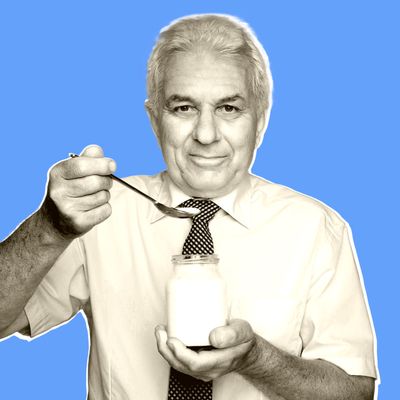
Here’s a fun exercise: Google “health benefits of yogurt” and count up all the overblown claims you can find in the search results. I did it this morning, and here are some of the things the internet promised: Yogurt will give me flatter abs, flawless skin, and a turbocharged immune system. (It also makes for a pretty good candlestick polish, apparently.)
Granted, there are plenty of real, substantive ways that yogurt can help the body (protein! calcium!). It’s just not the cure-all that some health sites hype it up to be. Nor is it a literal fountain of youth — though, as Smithsonian notes, around a hundred years ago, plenty of people mistook it for one.
The trouble started in the summer of 1904, when a biologist named Élie Metchnikoff delivered a lecture arguing that intestinal bacteria were a key factor in aging. Certain types of bacteria sped up the process, he said, but helpful bacteria, the kind found in yogurt or sour milk, could help slow it down:
Metchnikoff and his assistants had shown that sour milk didn’t spoil because of its acidity: In their experiments, microbes converted milk sugar into lactic acid, which, in turn, killed rot-causing germs in a laboratory dish. He speculated that if these microbes produced the same acidity in the human intestine, they might halt the “intestinal putrefaction” he believed precipitated aging. The best candidate, to his mind, was the so-called Bulgarian bacillus, a bacterium found in yogurt from Bulgaria.
“Interestingly, this microbe is found in the sour milk consumed in large amounts by the Bulgarians in a region well-known for the longevity of its inhabitants,” he said in his lecture, delivered in Paris. “There is therefore reason to suppose that introducing Bulgarian sour milk into the diet can reduce the harmful effect of the intestinal flora.”
That was on June 8. By the next day, as the Smithsonian piece
explains, newspapers began trumpeting yogurt as the magic anti-aging
bullet people had been waiting for — if not the cure for mortality, then
certainly a way of staving it off for a long time. Across Europe and the
U.S., articles hawked it as a food for people “who don’t want to age or
die,” “the secret of a long life,” and a means of “suppressing the
disastrous effects of old age.”
Metchnikoff eventually tried to undo the damage, publishing a pamphlet in 1905 urging everyone to just calm down — “clearly, we do not look upon the milk microbes as an elixir of longevity,” he wrote — but by that point, the runaway yogurt train was too far gone from the station.
Doctors everywhere started prescribing sour milk—also referred to as “butter-milk,” “Oriental curdled milk” or “yoghourt” in various variants of spelling—for anything from gonorrhea to gum disease. They gave it to patients to help prevent gout, rheumatism and the clogging of arteries. A medical review in Great Britain titled “On the Use of Soured Milk in the Treatment of Some Forms of Chronic Ill-Health” even recommended giving patients sour milk in preparation for surgery, as a disinfectant of the digestive tract.
In the end, it took no less a force than death itself to calm the yogurt craze: Twelve years after his lecture, Metchnikoff died at age 71, hardly an endorsement for a food that was supposed to dramatically extend a person’s life expectancy, and as a result the fervor temporarily died along with him. Over the following century, though, it continually found new life: as a digestive aid, as a diet food. Studies in recent years have made the case that yogurt may be linked to slower weight gain and reduced risk of high blood pressure, and that the bacteria in yogurt may offset some of the nastier side effects of certain antibiotics. As Metchnikoff noted, it’s also a source of probiotics, helping good bacteria in the digestive system to thrive.
But the current yogurt hype also has its skeptics. A study published last year, for example, found no evidence linking yogurt consumption to better mental or physical health. Plenty of physicians have criticized the health claims of some yogurt manufacturers; in 2010, Dannon paid a $21 million settlement to the FTC for overstating the benefits of its Activia brand. In the end, though, the story of yogurt is a story of longevity: the food whose halo of healthiness just won’t die.




